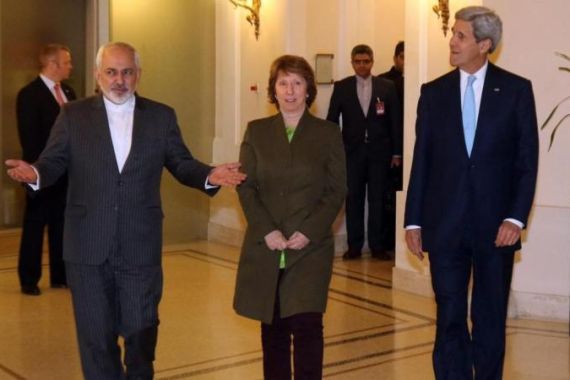Iran: Nuclear deal impossible before deadline
Iran and six main powers involved in Vienna talks are discussing possibility of extending Sunday night deadline.

Iran has said it was impossible to meet a deadline for reaching a deal with the main world powers over Tehran’s nuclear programme.
A member of Iranian negotiating team in Vienna told an Iranian news agency that Iran and the six main powers involved in the high-level talks in the Austrian capital were discussing the possibility of extending the talks if the parties failed to arrive to an agreement before Monday.
“The option of extending Geneva deal will be on the table, if we do not agree on a comprehensive political deal by the end of Sunday night in Vienna,” the official told ISNA.
US Secretary of State John Kerry had earlier said in Vienna that “serious gaps” remained between them and Iranians.
“We’re working hard,” he said.
Diplomatic traffic
Kerry, who on Friday postponed a trip to Paris to remain in Vienna for the talks, met Iranian Foreign Minister Mohammad Javad Zarif on Saturday afternoon, their fourth meeting in three days.
The first one-on-one meeting between the two politicians is scheduled for Sunday afternoon. Previous meetings were joined by other diplomats, at least by Catherine Ashton, the EU foreign policy chief.
On Sunday, Kerry met Saudi Foreign Minister Saud al-Faisal and German Foreign Minister Frank-Walter Steinmeier to update him on the talks.
Russian Foreign Minister Sergei Lavrov will arrive in Vienna on Sunday evening to take part in international talks on Iran’s nuclear programme, the country’s TASS news agency quoted a source with Russian delegation as saying.
In addition to German and US top diplomats, British Foreign Secretary Philip Hammond and French Foreign Minister Laurent Fabius are already in Vienna holding talks.
“Iranian sources say that a deal is no longer possible within the deadline and an extension may be in the works. However, Monday is still ahead, including the long hours of night and with all the decision makers being here in Vienna, it would be unwise to rule anything out,” Al Jazeera’s Jonah Hull, reporting from Vienna, said.
Intense talks
Iran and six powers – the US, China, Russia, Britain, France plus Germany (P5+1) – have been negotiating intensively since February to turn an interim accord reached with Iran a year ago into a lasting agreement.
Such a deal, after 12 years of rising tensions, is aimed at easing fears that Tehran will develop nuclear weapons under the guise of its civilian activities – an ambition Iran denies.
Iranian officials have refused to reduce the volume of uranium they are capable of enriching, a stand Western officials say is unacceptable as this would potentially allow Iran to amass enough fissile material for an atomic bomb in little time.
A second sticking point is the pace and sequencing of sanctions relief. Iran wants them terminated swiftly, not suspended and gradually scrapped, depending on the degree of Iranian compliance with the deal terms, as the West wants.
Another dispute is over the deal’s duration: Western countries want it to be up to 20 years but Iran wants this much shorter.